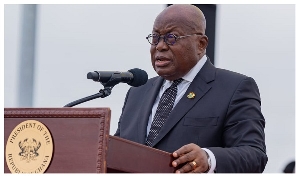- Home - News
- TWI News | TV
- Polls
- Year In Review
- News Archive
- Crime & Punishment
- Politics
- Regional
- Editorial
- Health
- Ghanaians Abroad
- Tabloid
- Africa
- Religion
- Election 2020
- Coronavirus
- News Videos | TV
- Photo Archives
- News Headlines
- Press Release
General News of Friday, 19 September 2003
Source: GNA
CHRAJ asked to disengage from labour related issues
Accra, Sept. 20, GNA - Professor Kofi Kumado, Director of the Legon Centre for International Affairs (LECIA), on Friday advised the Commission for Human Rights and Administrative Justice (CHRAJ) to consider disengaging itself from employer/employee.
He said the current structure of the Commission is too cumbersome to enable it focus on its core mandate to protect the human rights of the citizenry.
Prof. Kumado who was speaking at a roundtable discussion on the achievements, prospects and challenges of CHRAJ over the past 10 years, said most of the Commission's limited resources are spent on employer/employee relations.
The Centre for Democratic Development (CDD) and CHRAJ organised the discussion jointly to mark the Commission's 10th anniversary. He said even though its importance could not be dispute, "but we believe that many of those cases are largely contract rather than human rights or administrative justice matters."
Prof Kumado said it would be disastrous for the Commission in future if it should be given powers to prosecute because "the Commission is mandated to look after the rights of the people."
He explained that should the Commission be allowed that powers, it would be forced to always prefer charges against suspects and prosecute them because it would want to save its face.
Mr Emile Francis Short, Commissioner for CHRAJ, stressed the need to amend the Constitution or Act 456 to expand the membership of the Commission to a minimum of seven full time Commissioners to handle the extensive functions of CHRAJ to include persons from other disciplines other than law.
He said the current three-member Commission for an institution that combine the functions of a human rights commission, ombudsman and an anti corruption agency, is handicapped in discharging its diverse functions effectively.
Mr Short also called for a review of the Commissioners' salary structure, saying, pegging the salary with that of the judiciary creates a number of problems.
Professor Emmanuel Gyimah-Boadi, Executive Director of CDD, applauded the Commission for its success in tackling some of human rights abuses such as Female Genital Mutilation, penal colonies for alleged witches and the Trokosi system.
However, he said the Commission has not been proactive in educating Ghanaians on good governance, despite the widespread insensitivity to issues of conflict of interest among the public.
"It is true that Chapter 24 of the 1992 Constitution does not directly and exclusively charge CHRAJ with that responsibility, but CHRAJ is the most appropriate constitutional body to undertake this task, or at least to lead it."
Prof. Gyimah-Boadi said in the face of chronic resource constraints and the "huge size" of its mandate, CHRAJ has neither been adventurous nor strategic in choosing, which of its multiple mandates to focus.
Papa Owusu-Ankomah, Attorney General and Minister of Justice, said the government is committed to its declaration of zero tolerance for corruption and accountability of public office holders. He said the government also has a deep and abiding respect for human rights and was convinced that these principles are strong and essential pillars that underpin Ghana's search for good governance. Mr Owusu-Ankomah said the government considered CHRAJ as a major and principal partner in this regard and would is fully committed to the mandate of CHRAJ.
Government, he said, was sensitive to the limitations, shortcomings and deficits, which pose serious challenges to the effectiveness of the Commission and urged CHRAJ to see Government as a partner.










